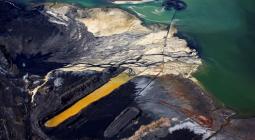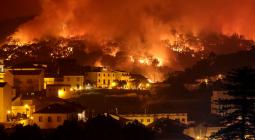In Cape Town, 'If It's Yellow, Let It Mellow' Is Practically Law.
The South African capital’s crippling water crisis has spawned a host of new taboos and industries.
It’s 11 am on a Saturday, and both my Cape Town local mall and my bladder are pumping. After one B-grade Americano too many, I slip into the gents. Look at the state of it! Whoever went before me hasn’t just left the seat down (and wiped it too); they’ve even gone and flushed. Whatever happened to “if it’s yellow, let it mellow”?
The heady aroma of stewed urine is just one of the taboos Capetonians have turned up their noses at in response to the city’s crippling water crisis. At the height of the crisis, the city published the ultimate name-and-shame: a map of the city that showed which addresses were using the most water. Social media shaming added to the fervor, and neighbors would comment passive-aggressively about one another’s suspiciously green lawns.
City dwellers also have started to get excited about flushing No. 2s with a quarter bucket of three-day-old shower water (there’s a certain Pythagorean fun to it); embraced dirty cars and learned to live with parched lawns and half-full swimming pools. We save rinse water from washing machine loads and dish-filled sinks; even hotels have urged guests to save their shower water in buckets. It’s a whole new world … and it’s produced real change.
WATER-SHAMING TACTICS HAVE HELPED CAPE TOWN REDUCE ITS DAILY WATER CONSUMPTION BY 48 PERCENT IN THREE YEARS.
The city managed to cut down from 1.2 billion liters per day in 2015 to just over 500 million at the peak of the drought. But, crucially, that’s leveled off at 622 million liters today, signs of lasting change. To put that in perspective, Californians achieved only a 27 percent reduction at the height of their 2016 drought. Cape Town’s tactics could help other cities at risk of running out of water — like São Paulo, Bangalore and Beijing — in their hour of need.
As with all taboos, folks are probably a bit naughtier behind closed doors. I can’t say for sure how often my neighbor showers (although by the smell of things, he is a fine citizen). And Mary Maurel, an architect turned landscape designer, confirms my suspicion that there is a trend among residents to have different standards for street-facing gardens and hidden ones. Public-facing areas tend to be brown, while greener garden areas tend to be tucked away and out of sight.
But what happens behind Cape Town’s notoriously high suburban walls is also heartwarming, says Maurel, especially among younger clients who have embraced less-thirsty indigenous plants wholeheartedly. Even if older clients still tend to prefer “lusher English-style” gardens, she says, they do water them less often … and never using municipal water.
On the water-shaming barometer, wasting tap water on your garden is on par with grand theft auto — good news for Mike Ness of Promech Boreholes, who has been in private well-boring game for 18 years. Ness says calls shot up from a pre-crisis average of 15 to as many as 500 per day. Sales too have “comfortably doubled,” he says, “or maybe tripled.” Ness notes that 90 percent of clients are installing filtration systems that allow them to use the water in their homes — something previously unheard of.
Companies making storage tanks — for both rain and well water — have done well too. Sebasti Badenhorst from JoJo Tanks used government census data to estimate that there’s now one tank for every nine Western Cape families, compared to a 1:35 ratio before the drought.
Another winner has been the artificial lawn industry, according to Marten Govender, the director of Perfect Grass. His Cape Town branch experienced a 50 percent jump in turnover compared to “single-digit uptake year-on-year” in Johannesburg. Homeowners are installing a combination of artificial lawn with drought-resistant plants, says Govender, who has also installed play areas at pre-primary schools as well as artificial sports fields at schools and clubs.
The swimming pool industry hasn’t been hit as hard as you would expect, says Mervyn Weavers, owner of Braun Pools, despite a ban on using municipal water in pools. People with wells are using them to fill their pools, while others rely on the city’s nascent non-potable water industry (yes, really). Besides, the average size of pools has “more or less halved,” says Weavers, and people are now doing much more to combat wastage and evaporation: A coverless pool is a big taboo, and systems that let you reuse backwash water have become commonplace.
On the flip side, James Dougan, whose company Thunder Brothers Car Wash has four outlets in the city, had “a very difficult year” — he says there’s been a 30 percent reduction in sales and a massive increase in overheads. Dougan has spent close to a million rand ($75,000) installing water recycling systems and retrofitting his spray hoses with more efficient nozzles. The worst of the drought may be over, but his company has halved its water consumption in perpetuity: Each of his car washes now uses considerably less water than the average American household.
There’s definitely an element of window dressing to it all — supermarket chains brag about leaving their trucks unwashed despite knowing full well that the increased air friction almost certainly results in a net environmental loss, and many restaurants conveniently stopped serving free tap water during the crisis.
But 4 million Capetonians have shown that when push comes to shove, a little bit of human ingenuity and a whole lot of “pee pressure” can solve any problem.
4 March 2019




